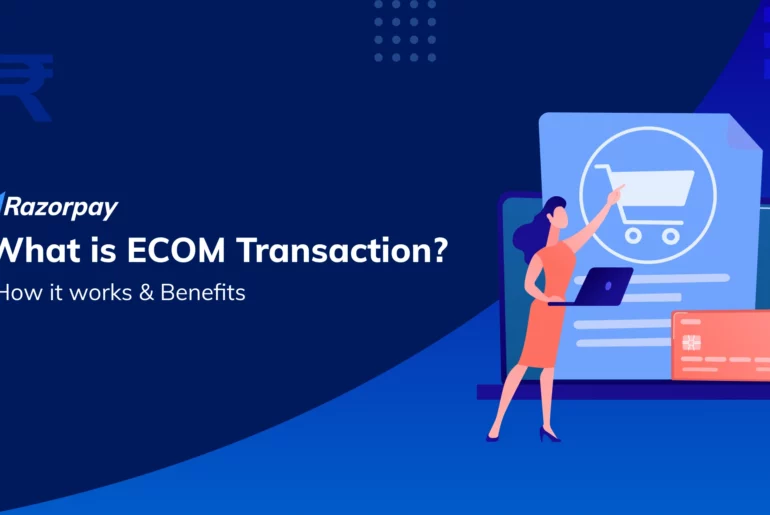ECOM transactions, short for e-commerce transactions, represent the backbone of online commerce. They encompass the buying and selling of goods and services over the Internet, facilitated through an online e-commerce payment gateway.
These transactions have revolutionised the way businesses operate, offering convenience, global reach and secure payment methods. In this digital age, understanding what is an e-commerce transaction and ECOM transaction meaning is pivotal for businesses and consumers alike.
Table of Contents
What is an ECOM Transaction?
An ECOM (e-commerce) transaction is a digital financial exchange that occurs when you buy and sell goods and services through online platforms. E-commerce transaction meaning involves the transfer of funds electronically in exchange for products or services, conducted via e-commerce websites or mobile applications.
In essence, ECOM transactions have become a cornerstone of the digital era, driving economic growth and transforming the way commerce operates. ECOM transactions enable businesses to expand their customer base beyond geographical constraints, while consumers enjoy a diverse array of choices and secure payment methods.
However, challenges such as a failed online transaction underscore the importance of reliable e-commerce platforms and payment gateways to ensure a smooth and trustworthy online shopping experience.
Must Read: India’s Best Payment Gateway for E-commerce Payments
How do ECOM Transactions Work?
1. Product Discovery
You explore online platforms such as websites or mobile apps. You browse through a wide range of products, often utilising search filters and categories to refine your choices.
Reading product descriptions, viewing images, and checking product reviews helps make informed decisions.
2. Adding to Cart
After finding the desired items, you add them to your virtual shopping cart with a simple click or tap. You can adjust quantities, remove items or continue browsing before proceeding to checkout.
3. Order Placement
You can initiate the checkout process by confirming your chosen products within the cart. Review your selections to ensure accuracy and try applying promotional codes or discounts. At this stage, the total order cost, including taxes and shipping fees, is typically displayed.
Related Read: What is the Difference Between a Barcode and a QR Code?
4. Secure Checkout
The checkout process demands the utmost security as you input sensitive payment information. You provide billing and shipping details, along with your preferred payment method, which may include credit / debit cards, digital wallets or other online payment options.
The selection of a trusted payment gateway is crucial in ensuring the confidentiality of this information. The best payment gateways employ robust encryption and security protocols to protect customer data.
Related Read: What are the Different Types of Digital Wallets?
5. Order Confirmation
After entering payment details and reviewing the order one final time, you confirm the purchase. You receive an order confirmation notification or email, providing a receipt and order tracking information.
A smooth and efficient checkout experience enhances customer satisfaction, encouraging repeat business and contributing to the success of e-commerce platforms. Hence, e-commerce businesses must prioritise the implementation of the best payment gateway for India and robust security measures to ensure a safe and seamless transaction process for their customers.
ECOM Transactions: Vital Characteristics
-
Digital nature: E-commerce transactions involve buying and selling goods and services through computer systems and the Internet, eliminating the need for physical presence.
-
Specialised techniques: E-commerce employs specialised techniques for transactions, including online payment gateways, digital wallets and secure encryption methods. This ensures data privacy.
-
Wide scope: E-commerce transactions serve businesses, individuals and organisations alike. It’s not limited to a particular sector or audience.
-
Varied order methods: Orders can be placed through websites, mobile apps or even voice-activated devices, thus providing flexibility.
-
Online and offline payments: You can use electronic means like credit cards or offline methods like cash on delivery to pay for goods and services.
What are the benefits of ECOM transactions?
-
Efficient delivery: E-commerce offers quick and effortless delivery of items, reducing the wait time associated with traditional retail.
-
Swift issue resolution: Issues and inquiries can be resolved swiftly through online channels, enhancing customer satisfaction.
-
Time and resource savings: E-commerce saves time, effort and resources for both customers and companies by streamlining the buying process and reducing the need for physical infrastructure.
-
Cost reduction: E-commerce significantly reduces transaction costs compared to brick-and-mortar retail, with lower overhead and operational expenses. Companies can eliminate fixed costs associated with physical stores, such as rent and utilities, leading to higher profit margins.
-
24/7 shopping: E-commerce provides the convenience of 24/7 shopping availability, allowing you to make purchases at your convenience, irrespective of time zones.
Conclusion
E-commerce transactions have become an integral part of the modern economy, offering unparalleled convenience, cost-effectiveness and accessibility. They not only benefit businesses by reducing operational expenses but also empower consumers with a seamless and flexible shopping experience. This shift towards electronic commerce continues to shape the way we conduct transactions and interact with products and services in the digital age.
Frequently Asked Questions (FAQs)
1. What if e-commerce transactions fail?
If e-commerce transactions fail, it may be due to various reasons such as insufficient funds, technical issues or security concerns. You should contact your card issuer or payment gateway for assistance.
2. What is an ECOM transaction on a debit card?
An ECOM transaction on a debit card refers to a digital financial exchange involving the purchase of goods or services online using a debit card as the payment method.
3. How do I activate ECOM transactions?
You typically don’t need to take any specific action for this since most debit and credit cards are usually pre-enabled for online transactions by your bank or card issuer.
4. Is there any charge for ECOM transactions?
Whether there is a charge for ECOM transactions depends on your bank or financial institution; some may impose fees, while others offer them as part of your account benefits. It’s best to check with your bank for specific details.

